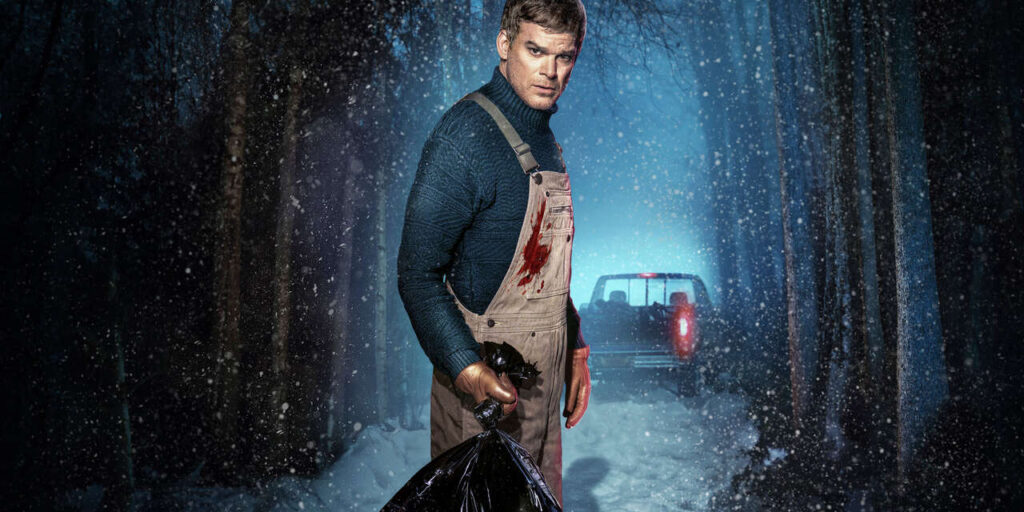Few series have ended as unceremoniously—and, frankly, terribly—as “Dexter.” Eight years after the eighth season finale “Remember the Monsters?” included some of the absolute worst “dramatic” scenes to air on Showtime aside from the perpetual Islamophobic fearmongering of “Homeland,” “Dexter” returns to claw back some shreds of respectability with the miniseries “New Blood.” And somehow, miraculously and inexplicably, “New Blood” might actually pull it off.
With style, humor, and self-awareness, “New Blood” returns to the original “Dexter” themes of violence as catharsis and vigilantism as pleasure. Original cast members Michael C. Hall and Jennifer Carpenter reprise their roles as serial killer Dexter Morgan and his (deceased) detective sister Deb, respectively, and their deep knowledge of these characters helps them navigate familiar ideas with rekindled verve. “Dexter” always was a little bit trashy in a satisfyingly silly way—all bright red viscera, aghast facial expressions on decapitated heads, and of course the “Surprise, motherf—er!” meme—and “New Blood” taps into that glee.
But the miniseries also feels pointedly, deliberately informed by the failure of the original run’s latter seasons: by Deb falling in love with Dexter (why?), by Dexter dumping her dead body in the path of an oncoming hurricane (why?), by Dexter’s son Harrison ending up in South America while Dexter put a whole continental United States between himself and Miami (why?!). Some of this is probably because of the return of initial showrunner Clyde Phillips, who dreamed up the idea for this miniseries and the decade-long time jump that begins it. And some of this is also because of how pop culture has changed in the years since “Dexter” ended.
Progressive causes have become more mainstream and more widely discussed on TV, and they pop up here. Additional acting, writing, and development opportunities have rightfully materialized for members of underrepresented communities, and they pop up here, too. “New Blood” incorporates both of those approaches, and in the four episodes provided for review, those components seem to expand where the miniseries could go. Don’t be worried: “New Blood” is still a little bit cheesy, and still a little bit predictable. Emotions are still highly elevated, so much so that it almost qualifies as melodrama. There are still serial killers hiding in plain sight, because of course there are, and Dexter is still going to get drawn in against his better judgment, because of course he is. There is a certain comfort to watching “New Blood” because of its narrative reliability. But so far, the upstate New York location, with all its pristine ice and snow waiting to be marred by a hot spurt of fresh blood, provides a new milieu of garish potential.

It is December 2021, and a decade after leaving Miami, Dexter Morgan (Hall) has renamed himself Jim Lindsay. For the past couple of years, Jim has lived in the small town of Iron Lake, New York. He works as a sales associate at the local fish and game store, keeps goats, a pig, and chickens on his property, and is dating the town’s chief of police, Angela Bishop (Julia Jones, one of two Taylor Sheridan-project veterans in the cast, alongside Gregory Cruz). He hasn’t killed anyone in all this time, partially because of the constant presence—haunting, really—of his sister Deb. (Carpenter is having a great time in this role, ripping into Hall’s Dexter with snark, smarm, and fury.) Instead, he’s just a regular guy, dating a woman he says he loves, eating a lot of baked goods, and even line dancing at the local dive bar.
Until, of course, an array of interruptions to his routine set off a spiral of bad behavior. First is the arrival of a finance bro who might have literally gotten away with murder. Then Angela’s request for additional resources to investigate a series of missing women is denied, and she receives backlash from the Seneca Nation for not pushing harder to protect her fellow Indigenous women. Next up is the presence of a literal oil baron whose environmentally damaging deeds attract an array of Gen-Z protestors, including Angela’s daughter Audrey (Johnny Sequoyah). And finally, there’s Harrison (Jack Alcott), the son Dexter left behind, who appears to reconnect with his father and understand why he’s living under a new name—and to maybe start on a path Dexter has long feared.
A number of these elements are original “Dexter”-adjacent—Dexter’s close relationship with the police, his ability to ingratiate himself into investigations, his tendency to lie and deny. But “New Blood” has built out enough of a world that there are subplots here with the potential to spiral in intriguing directions. The Seneca Nation storyline has real-world urgency, and the incorporation of the Murdered & Missing Indigenous Women campaign at least counters accusations of using actual tragedies for entertainment. Clancy Brown is excellent, per usual, as a man with shadowy motives, and Jamie Chung’s appearance as a true-crime podcaster reflects another part of the evolving pop-culture landscape and how we sensationalize violence. And although the series’ first four episodes do not yet dive fully into supersaturated gore, they certainly suggest more to come, along with at least a little bit of consideration as to why we so enjoy watching people kill and be killed.
Ultimately, though, the appeal of “New Blood” comes down to Hall and Carpenter, who chew, gnaw, and bite into their dialogue, and who thoughtfully find the layers of contrasting motivations and shared sympathies between their characters. Hall’s beleaguered reactions to Carpenter’s foul-mouthed badgering; her gently reassuring “I love you for it” when Dexter decides not to kill; their expressivity when bringing to life various horror-movie scenarios, like Deb trying to climb out of an ice-fishing hole before being dragged down. The intimacy the pair brings to their fighting and their friendship increasingly elevated this show’s stakes before the original “Dexter” catapulted their relationship into the ocean. “New Blood” comes to life in their hands.
Four episodes screened for review. “Dexter: New Blood” premieres on Showtime on Sunday, November 7th.












